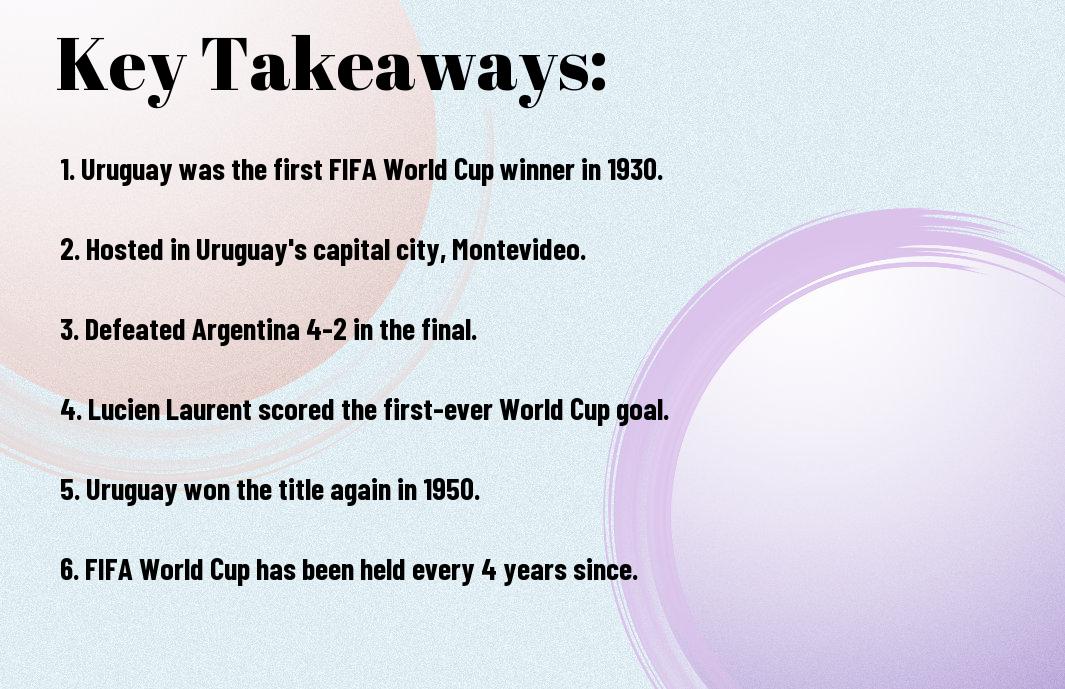There’s a fascinating tale behind the inaugural FIFA World Cup held in 1930. The journey to victory was fierce, culminating in a showdown between two talented teams. Your curiosity leads you to uncover the mystery of which country emerged triumphantly in this historic tournament. Join us as we examine into the captivating history of the first-ever FIFA World Cup champion.

Key Takeaways:
- Uruguay: Won the first FIFA World Cup in 1930 held in Montevideo, Uruguay.
- Host Nation: Uruguay was the host nation of the inaugural FIFA World Cup and emerged as the champions.
- Victory: Uruguay defeated Argentina 4-2 in the final to claim the title of the first FIFA World Cup champions.

The Birth of the FIFA World Cup
The Conceptualization of the Tournament
Birth of the FIFA World Cup came from the idea of creating a global football championship. The concept was born out of a desire to bring together nations from around the world to compete in a prestigious and unifying sporting event. The visionaries behind this tournament aimed to foster goodwill and sportsmanship among countries, transcending political boundaries through the universal language of football.
The First Edition in 1930
Edition of the FIFA World Cup in 1930 marked the inaugural tournament held in Uruguay. This historic event was a culmination of years of planning and anticipation, as teams from 13 nations gathered to vie for the title of world champions. The tournament was a groundbreaking moment in sporting history, setting the stage for the prestigious competition that would captivate fans worldwide for decades to come.
With the first FIFA World Cup in 1930, Uruguay emerged as the victorious nation, etching their name in footballing folklore. This momentous occasion laid the foundation for the future editions of the tournament, becoming a symbol of unity and competition on the world stage.

The Host Country
Clearly, the first FIFA World Cup held in 1930 was a momentous occasion in the history of football. The host country for this inaugural tournament was Uruguay, a nation known for its deep passion for the sport.
Uruguay: A Nation Passionate About Football
Country renowned for its footballing fervor, Uruguay was the ideal choice to host the first-ever FIFA World Cup. The people of this South American nation live and breathe football, and the sport is deeply ingrained in the country’s culture and identity. It was only fitting that Uruguay played a pivotal role in the birth of this prestigious international competition.
The Chosen Venue: Estadio Centenario
Any football fan worth their salt knows about Estadio Centenario, the historic stadium in Montevideo where the final match of the first FIFA World Cup took place. This iconic venue has witnessed some of the most legendary moments in football history, and its significance in the sport cannot be overstated.
Passionate football enthusiasts from around the world descended upon Estadio Centenario to witness the thrilling matches that unfolded during the tournament. The stadium’s rich history and electric atmosphere added to the excitement of the inaugural FIFA World Cup, cementing its status as a hallowed ground for football aficionados.
The Participating Teams
Many nations dreamt of glory in the inaugural FIFA World Cup held in 1930 in Uruguay. The excitement was palpable as teams from across the globe prepared to compete in the prestigious tournament.
The 13 Nations That Took Part
An elite group of 13 nations earned the honor of participating in the first-ever FIFA World Cup. These teams included Uruguay, Argentina, Brazil, Chile, Paraguay, Peru, Bolivia, Mexico, the United States, France, Belgium, Yugoslavia, and Romania. Each team brought their unique style of play and fervent national pride to the tournament, creating an atmosphere of fierce competition and sportsmanship.
The Qualification Process
Qualification for the 1930 FIFA World Cup was a simpler affair compared to the complex system in place today. The host country, Uruguay, automatically qualified for the tournament, while the remaining 12 spots were allocated regionally. South America had four guaranteed spots, Europe had four, and North and Central America had two each. This straightforward process made it easier for nations to secure their place in the historic event.
Understanding the qualification process of the first FIFA World Cup gives you insight into how the tournament was structured and how teams were chosen to represent their countries on the world stage. It was a time when football was still evolving, and the excitement of international competition was just beginning to captivate audiences worldwide.
The Tournament Format
Despite facing challenges due to long distances and limited travel options in 1930, the inaugural FIFA World Cup in Uruguay was a remarkable success. The tournament showcased the best teams from around the world, all vying for the prestigious title of world champions in the sport of football.
The Group Stage
With 13 participating teams divided into four groups, the format of the tournament in 1930 was simple yet competitive. Each team played against the others in their group, with the top two advancing to the knockout stage. The group stage provided an opportunity for countries to display their football prowess on the global stage and set the tone for the intense matches to come.
The Knockout Stage
Any mistakes in the knockout stage could cost a team their chance at glory. Once the group stage concluded, the knockout stage began with the quarterfinals, followed by the semifinals, ultimately leading to the final match where the world champion would be crowned. The knockout stage intensified the competition as teams fought fiercely for a spot in the next round, knowing that every goal could make the crucial difference between victory and defeat.
In the knockout stage, the pressure was on as teams faced sudden elimination with each match. The intensity of the knockout stage brought out the best in players, as they showcased their skills and determination to advance towards the ultimate prize of becoming world champions.
The Road to the Final
Once again, if you want to probe into the history of the first FIFA World Cup held in 1930, you can learn more about it here. It was an event that marked the beginning of a legendary journey in international football.
The Semifinals
The Semifinals were intense battles where the best teams clashed for a spot in the prestigious final match. The matches showcased the skill, determination, and passion of the players as they fought for victory on the grand stage. Each team gave their all, displaying remarkable sportsmanship and a deep love for the game.
The Third-Place Match
Any journey to the World Cup Final is full of twists and turns, and the Third-Place Match is no exception. While not the ultimate goal, it is a chance for teams to leave their mark on the tournament and secure a podium finish. This match is a test of resilience and character, as teams battle it out one last time to claim a place of honor in the competition.
Another opportunity to showcase their talent and determination, the Third-Place Match is a chance for players to shine and for fans to witness more thrilling football action. It may not be the final everyone dreams of, but it is a match filled with pride, passion, and the drive to succeed.
The Inaugural Champions
Uruguay’s Journey to the Title
Now, let’s explore into Uruguay’s remarkable journey to becoming the first FIFA World Cup champions in 1930. An underdog team at the time, Uruguay proved their mettle by defeating formidable opponents and showcasing their skill and determination on the field.
The Final Match Against Argentina
Final: In the final match against Argentina, tensions ran high as these two South American rivals battled it out for the coveted title. The game was intense, with both teams giving their all on the field in front of a passionate crowd.
Argentina: Despite Argentina’s strong performance, it was Uruguay who emerged victorious, securing a 4-2 victory and etching their name in football history as the first-ever FIFA World Cup champions. The success of Uruguay in the inaugural World Cup set the stage for their future dominance in international football.
Conclusion
On the whole, the first FIFA World Cup held in 1930 was won by the host country, Uruguay. Keep in mind, this historic event set the stage for what would become one of the most watched and celebrated sporting events in the world today. As you investigate into the history of the World Cup, let the victory of Uruguay in the inaugural tournament serve as a reminder of the rich legacy and passion that this global competition embodies.
FAQ
Q: Which country won the first FIFA World Cup in 1930?
A: Uruguay won the first FIFA World Cup in 1930.
Q: Who were the runners-up in the first FIFA World Cup in 1930?
A: Argentina finished as the runners-up in the first FIFA World Cup in 1930.
Q: Where was the first FIFA World Cup held in 1930?
A: The first FIFA World Cup was held in Uruguay in 1930.



